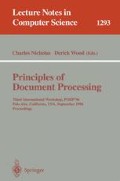Abstract
This paper describes how an executable Interval Temporal Logic may be used as a formalism for specifying and manipulating temporal constraints among objects within multimedia documents. The paper presents a taxonomy of such constraints, based in part upon the functionality of existing systems such as the HyTime standard, Firefly and MHEG. It then shows, largely by a series of examples, how each of the elements of this taxonomy can be accommodated in this formalism. It also suggests how this formalism could assist the author in modelling and testing such sets of temporal constraints, and hence serve as an aid in prototyping such documents.
Preview
Unable to display preview. Download preview PDF.
References
J. F. Allen, Maintaining Knowledge about Temporal Intervals, Communications of the ACM, vol. 26, No 11, Nov. 1983.
H. Bowman, L. Blair, G. S. Blair and A. G. Chetwynd, A formal description technique supporting expression of quality of service and media synchronization, Multimedia Transport and Teleservices International COST 237 Workshop, Vienna, Austria, Nov 1994. Appears as LNCS no. 882, Springer Verlag, 1994.
M.C. Buchanan and P.T. Zellweger, Scheduling multimedia documents using temporal constraints, Proceedings of the Third Int. Workshop on Network and Operating System Support for Digital Audio and Video, Ed. P.V. Ragan, LNCS no. 712, Springer Verlag, 1993.
R. Erfle, Specification of temporal constraints in multimedia documents using HyTime, EP94: Proceedings of the Fifth Int. Conf. on Electronic Publishing, Document Manipulation and Typography, Eds. C. Hüser, W. Möhr, and V. Quint, pp. 397–411, J. Wiley, 1994.
R. Hale, Using Temporal Logic for Prototyping: the Design of a Lift Controller. LNCS no. 379, Springer Verlag, pp 375–408, 1989.
ISO 10744, Information Technology — Hypermedia/Time-based Structuring Language (HyTime), 1992.
ISO CD 13522, Working Draft: Information Technology — Coded Representation of Multimedia and Hypermedia Information Objects, 1993.
P.R. King, Vers un formalisme basé sur la logique temporelle pour l'expression de contraintes temporelles dans les documents multi-média, Rapport de Recherche no 942, LRI, Universitè de Paris Sud, Orsay, France, December 1994.
R. Milner, A Calculus of Communicating Systems, LNCS no. 92, Springer Verlag, 1980.
B. Moszkowski, Executing Temporal Logic Programs Cambridge University Press, 1986.
B. Moszkowski, Some Very Compositional Temporal properties, Proceedings of Programming Concepts, Methods and Calculi. IFIP Transactions A-56, Ed E.-R. Olderog Amsterdam: North-Holland 1994, pp 307–326.
Author information
Authors and Affiliations
Editor information
Rights and permissions
Copyright information
© 1997 Springer-Verlag Berlin Heidelberg
About this paper
Cite this paper
King, P.R. (1997). A logic based formalism for temporal constraints in multimedia documents. In: Nicholas, C., Wood, D. (eds) Principles of Document Processing. PODP 1996. Lecture Notes in Computer Science, vol 1293. Springer, Berlin, Heidelberg. https://doi.org/10.1007/3-540-63620-X_57
Download citation
DOI: https://doi.org/10.1007/3-540-63620-X_57
Published:
Publisher Name: Springer, Berlin, Heidelberg
Print ISBN: 978-3-540-63620-5
Online ISBN: 978-3-540-69614-8
eBook Packages: Springer Book Archive

